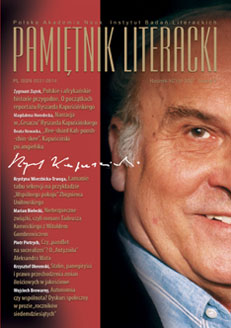Łamanie tabu sekrecji na przykładzie „Wspólnego pokoju” Zbigniewa Uniłowskiego
Breaking the Taboo of Secretion on the Example of Zbigniew Uniłowski’s “Sharing A Room”
Author(s): Krystyna Wierzbicka-TrwogaSubject(s): Literary Texts
Published by: Instytut Badań Literackich Polskiej Akademii Nauk
Keywords: Zbigniew Uniłowski; "Wspólny pokój (Sharing a room)"; secretion motive
Summary/Abstract: In the article I put forward the idea that the drastic description of physiology in Uniłowski’s novel "Sharing a room" is not its “naturalistic element”, but is meant to construct a symbolically marked space. Analyzing the design of the flat described by Uniłowski, I conclude that it is a symbolic expression of his anthropological beliefs referring to the nature and man’s duty. In this view a man is captivated by his physicality and can only strive to limit its power over himself; the aim of man’s life should be a Norwidian combination of the Beauty and Work, which Uniłowski signals by juxtaposing a gloomy sphere of biology (put in a blind kitchen) with the light which falls into the room through the window together with voices of a beautiful singing at work. Norwid supports, as I see it, not only the ideological significance of the novel, but also the use of secretion motive.
Journal: Pamiętnik Literacki. Czasopismo kwartalne poświęcone historii i krytyce literatury polskiej
- Issue Year: 2007
- Issue No: 3
- Page Range: 63-73
- Page Count: 11
- Language: Polish

